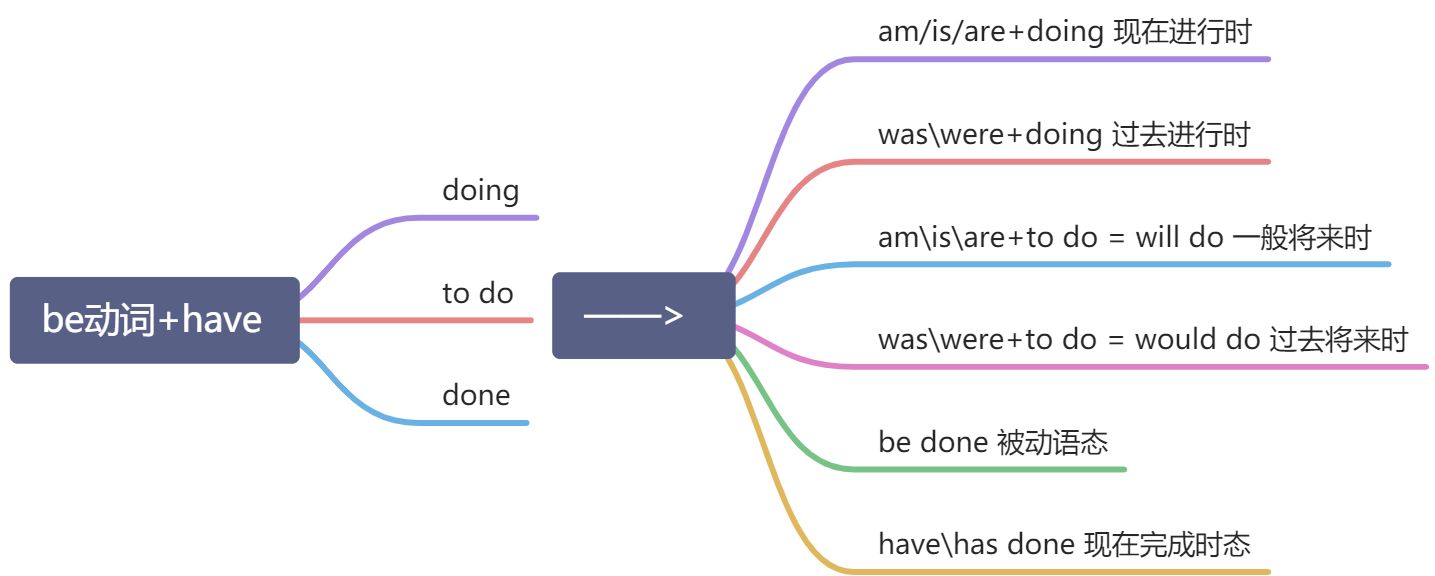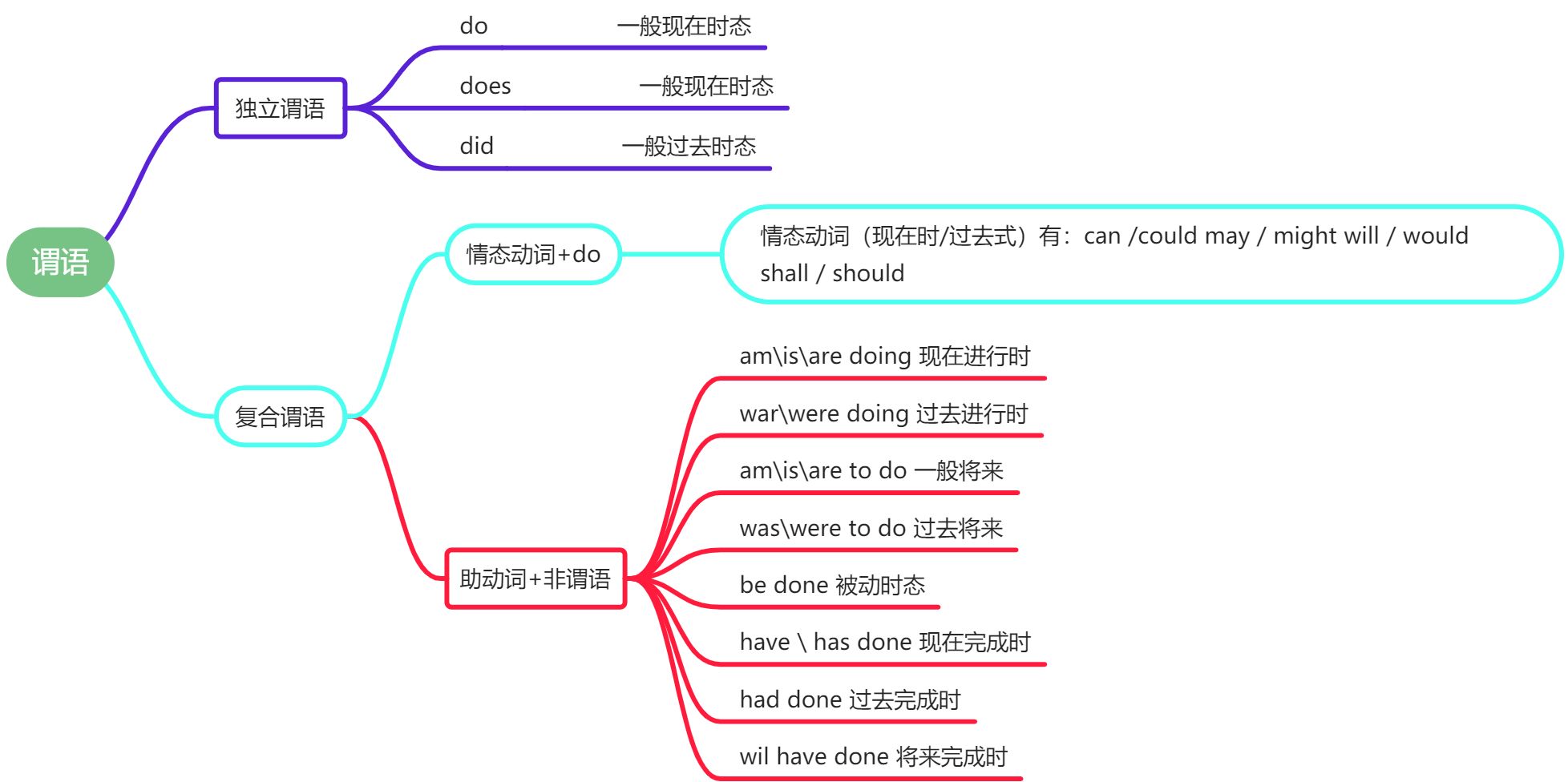导学
思考:
What is the biggest difference between Chinese and English?
动词的变化
| 例词 | 名称 | 符号 | |
|---|---|---|---|
| abandon (V.放弃) | 原形 | do | 谓语动词 |
| abandons | 单三 | does | 谓语动词 |
| abandoned | 过去式 | did | 谓语动词 |
| abandoning | 现在分词 | doing | 非谓语动词 |
| abandoning | 动名词 | doing | 非谓语动词 |
| abandoned | 过去分词 | done | 非谓语动词 |
| to abandon | 不定式 | to do | 非谓语动词 |
动词的原形就是它的复数形式
They abandon thieir car in park.
主语为复数 谓语动词
变形:
He abandons thieir car in park.<br /> 主语变为单数
abandon单独做谓语不加任何助动词且单独使用为谓语动词
动词和名词正好是相反的,如名词picture(n.画) 后加s变为复数形式pictures,而动词加s不是变成复数形式,而是变为单数。 谓语动词功能:不需要加任何助动词就可以充当谓语(do、 does、 did)叫做独立谓语 非谓语动词功能:除了不能做谓语此外,剩下的一律都可以充当。(可以做主语、宾语、定语、状语、宾补。)但其前面加助动词还是可以做谓语的。
谓语动词——独立谓语
do
独立谓语 does
did
谓语动词——复合谓语
(一)情态动词 + do(动词原形)
**He** can does
单三 不能因为He是单三就用does.
**He** can do
情态动词can,参与进来,要用动词原形do
📕知识补充:常见情态动词
现在时 || 过去时
can ——could (能够)
may ——might (可能,也许)
must ——must (必须)
will ——would (将会)
shall ——should (将会/应该)
🐖注意:(2018年考过)will可用于任何人称(万能型:第一人称 I We 第二人称 you you 第三人称 he、she、it、they),而shall范围局限,只能用于第一人称之后 I we.
(二)助动词+非谓语
am/is 过去式 was
📚谓语的动词总结
谓语动词能告诉我们什么?
1.He lived in hte city . 时态语态
谓语动词lived,为一般过去时(谓语V词did过去式);
当谓语动词变成lives时(does单三,谓语动词)——>will live/is to live(一般将来时)
He has lived in the city. 由 has/have (助动词)+done(非谓语)(现在完成时)
He had lived in the city. 由 had(助动词)+done(非谓语)(过去完成时)
由以上可说明谓语动词形式上的变化能得出来不同时态的变化。
2.Has he lived in the city. 半倒装
助动词Has提前放在主语前面,谓语动词不变,为半倒装。
3.
(1) They live in the city.
主谓一致
(2) He lives in the city.
(2)当主语为单三(He)谓语动词也应该为单三形式。
4.
:::info
(1) If it rains tomorrow, the meeting will be cancelled.
如果明天🌧者这个会议将会取消。
① If引导的条件状语从句,该从句里面谓语动词为rains(单三does)而does为独立谓语一般现在时。
② will + 动词原形 构成一般将来时 主将从现(主句用一般将来时态从句用一般现在时态)
明天是不是下雨这是一个,这是一个完全有可能实现的一种条件,只要由一丁点完全可能实现的条件,那么这都是真实的条件,如果该条件为真实的条件就会用到主将从现的考点。 :::
:::info
(2)If it **were the end of the world tomorrow, human beings would disappear** form the earth. 虚拟语气
如果明天是世界末日,那么人们将会从这个世界上消失。
① 虽然主语为it单数,但谓语用的是were,would disappear ,would 加动词原形 (would为情态动词will的过去式,情态动词+do(动词原形))
明天是世界末日这个条件是没有可能的,不可能实现,这就是假的条件,只要是假的条件,就是一种虚拟的条件,只要是虚拟的条件就要使用虚拟语气。 :::
5. :::info (1) I am a student. 简单句 句式
只有一个谓语动词am
:::
:::info
(2)I like English. 简单句 句式
谓语动词为like
两个简单句组合后:
I **am a student and I like** English.并列句 句式
I** am a student who likes **English. 主从复合句 句式
:::
第一讲:时态语态——一般现在时
一、谓语构成:
原形do \ 单三does 主谓一致
🚩单三(does)要满足一下条件:
①主语必须为单数
②主语必须是第三人称
人称代词分为单数和复数
(一)两格(主格和宾格)靠位置进行区分:
①主格在谓语前做主语。 I like English.
②宾格用在及物动词或者介词后做宾语。 He helped(及物动词) me.
(二)两代(形容词性物主代词和名词性物主代词)靠后面跟的词性及含义:
①形代(形容词性物主代词):……的;+ n.(名词) my book.
②名代(名词性物主代词):…….的;不加 n.
二、用法
1.经常发生的动作:
时间状语:
always,often,usually,sometiem,once a week(twice three times + 时间段),every(day,week,month,year)+时间
考点: 每隔: every + 序数词(>1)day 每隔….天 every + 基数词 +days 每……天 every day 副 时间状语 everyday adj. 定语
【例题】
1.According to(依据、根据) the time table(时刻表), the plane for New York leaves__ at 8:00 a.m **【from Monday to Friday】.**
A.was leaving B.leaves C.is leaving D. has left
According to=based on…… 依据/根据…….
分析:从早上八点到周一到周五,为习惯性动作,B.选项 为动词单数(leaves)
A.过去进行时 was\were + doing、B. is leaving (am\is\are+doing)现在进行时、
考点: ①leave 考点
:::tips
①leave + sp(someplace地方) :离开某地
left(过去式)left(过去分词)**
:::
2.Students usuallytakepart in the exam 【twice a year】.
A.take B.takes C.took D.taking
分析B.takes(V.单三)而使用单三要满足以下条件:①主语为第三人称; ②主语为单数 ;也就是主语为第三人称单数 而主语Students(n.第三人称复数)但是它是一个复数,进而不能使用does;
固定搭配:take part in 参加
考点:②名词的单复数和动词的单复数恰好是相反的;
:::tips
①名词 + s 为复数;不加s为单数.
②动词 + s 为单数,不加s为复数.
took(过去式) taken(过去分词)
:::
:::tips
2.客观事实和普遍真理:
【例题】
The scientis **told** us that the earthtravels_around the sun.
A.traveled B.travel C.is traveling D.travels
分析地球绕着太阳转这个习惯性动作随着时间的改变而不会发生改变的这个动作就是客观事实和普遍真理而用一般现在时态(do);进而要不用原形,要不用单三 C(is travling- am\is\are +doing 现在进行时)除去;
the earth 为单数地球(是唯一的单数)主语为单数且为第三人称用does travels.
travel around. 围绕……运作**
3.主将从现与主析从现⭐⭐⭐⭐
一、主将从现
介绍:主将从现
①主:主句
②将:一般将来时:will do
③从:从句
④现:一般现在时 do/does
连词的出现我们才能知道那个是从句那个是主句。紧跟在连词后面的那句话就是从句。
常考的连词有以下七个:
:::success
1.when 当…..时候 (引导的是时间状语从句)
2. if 如果 (引导条件状语从句) 肯定条件
3. as soon as 一……就 (引导的是时间状语从句)
4. unless 如果不,除非 (引导条件状语从句) 否定条件
5. in case 以防万一,以防 (引导条件状语从句)
6. the moment 一……就 (引导的是时间状语从句) (n. 名词性短语具有连词的性质)
7.once 一旦…… (引导条件状语从句)
:::
考点:③连词位置的分析主句和从句的考法
:::success If 句1 ,句2. 则:句1为从句,句2为主句
句1 If 句2 则: 句1为主句 句2为从句
也就是连词后面紧邻这的句子为从句,剩下的一个为主句。
其他的连词和if的一样
:::
 【例 2016-95】
【例 2016-95】
We **will hold a sports meeting next Monday if it won’t rain.
分析关键词 if 放在两句话中间则前面的是主句,后面的为从句,本题主句使用的是will hold (will + do)主将,所以后面的从句要用从现(一般现在时do/does)而本题使用的是won’t rain(won’t = will not)是一般将来时态(否定 will not),要改为一般现在时态:
天下雨 : it rain.
it(第三人称单数)要用 谓语动词 does (rain——> rains)
变成否定句 it doesn’t rain(借来的助动词)
规则:先选再改
D 改为 doen’t 或 D——>** doen’t **
考点:④变否定句和变一般疑问句的说明:
:::success
找到这段话的谓语-> 可以转到谓语的总结
①变否定句:
(1)如果这段话的谓语为复合谓语:直接在情态动词或助动词的后面加not。 (情 not do, 助 not 非)
(2)如果这段话的谓语为独立谓语要借:独立谓语分为原形、单三、过去式;分别借 do does did 然后在其后加not变为:**don’t doesn’t didn’t + 动词原形 **就变成了否定句。
②变一般疑问句:
(1)如果这段话的谓语为复合谓语:直接在情态动词或助动词放在主语前面。
(2)如果这段话的谓语为独立谓语:要把借来的助动词放在主语的前面 + 动词原形。
【例如】
1. It **will rain** tomorrow. 明天将会下雨。
先找句子的谓语(是独立还是复合谓语)will rain** 为这句话的复合谓语(情态动词will + do)变否定句 情态动词 + not + do. 为:
It will not rain tomorrow. 又因为will not = won’t(简写形式)
2. It rained yesterday. 昨天下雨了。**
变否定句:
先找句子的谓语(是独立还是复合谓语)rained为独立谓语(did 过去式),独立谓语变否定借 It **didn’t rain** yesterday. (didn’t + do )
3. It rains .
变否定句:
谓语为独立谓语(does单三),变否定为 It doesn’t rain.
:::
1 . -what **will Bill do**, if he _in the test?
—He will try again.
A.fail B.fails C.will fail D.is failling
分析关键词 if(连词)前为主句 will Bill do. (will+do 主将),从句要用一般现在时(do/does),要么使用原形要么使用单三,fail 或fails,有因为(从句)主语为he(单数第三人称)即单三的用法,后用动词的单数(does)即为fails。
2.The students **will plant** trees, if it _ tomorrow.
A. didn’t rain B.hasn’t C.won’t rain D.doesn’t rain
分析关键词 if(连词)前为主句 will Bill do. (will+do 主将),从句要用一般现在时(do/does),要么使用原形要么使用单三的否定形式,要么do变don’t does变doesn’t又因为(从句)主语为it为第三人称单数,及单三的用法,后面要用动词的单数does否定,即为doesn’t + do(动词原形)
3.if you ___somking and drinking,you health will improve soon.
A.gave up B.give up C.had given up D.will give up
If 放在了最前面,说明接邻这后面的句子为从句,用从现而(从句)主语为you,用原形do 为give up
考点:⑤不规则动词give
:::success
不规则动词give
give ———>gave(过去式)——>given(过去分词)
give up 放弃
give up smoking. 戒烟
:::
二、主祈从现
【例题】
please tell** her the news when she_.**
A.comes B.will come C. come D.would come
分析连词when前为主句 please + do(动词原形) 构成祈使句,进而主祈从现,(从句)主语为单数第三人称 + does——> comes
一般过去时态
一、谓语构成:过去式
过去 将来<br /><———————————————— ————————————————><br />-----------------------------------------|------------------------------------><br /> now(现在)
动词的过去式分为规则变化和不规则变化:
规则变化:ed (本身带有e) d
不规则变化:无规律可言 speek~spoke(过去式) ~poken(过去分词)
take~took(过去式)~taken(过去分词)
常见的动词的过去式和过去分词:
drink—-drank——drunk
ring——rang——-rung
swim——swam——swum
sing——sang——sung
sink——sank——sunk
blow——blew——blown
grow——grew——grown
know—-knew—-known
fly ——flew——flown
take——took——taken
shake——shook——shaken
drive——drove——driven
write—-wrote—-written
rise—-rose—-risen
ride——rode——ridden
speak——spoke——spoken
steal——stole——stolen
break——broke——broken
wake——woke——woken
freeze——froze——frozen
forget——forgot——forgotten
choose——chose——chosen
draw——drew——drawn
eat——ate——eaten
fall——fell——fallen
give——gave——given
hide——hid——hidden
see——saw——seen
do——did——done
cost(花费) cost cost
cut(割) cut cut
hit(打) hit hit
hurt 伤害) hurt hurt
let(让) let let
put(放) put put
read (读) read read
(2) AAB型(动词原形与过去式同形)
beat(跳动) beat beaten
(3) ABA型(动词原形与过去分词同形)
become(变成) became become
come(来) came come
run(跑) ran run
(4) ABB型(过去式与过去分词同形)
dig(挖) dug dug
get(得到) got got
hang(吊死) hanged hanged
hang(悬挂) hung hung
hold(抓住) held held
shine(照耀) shone shone
sit(坐) sat sat
win (赢) won won
meet(遇见) met met
keep (保持) kept kept
sleep(睡) slept slept
sweep(扫) swept swept
feel(感觉) felt felt
smell(闻) smelt smelt
leave(离开) left left
build(建设) built built
lend(借出) lent lent
send (传送) sent sent
spend(花费) spent spent
lose (丢失) lost lost
burn (燃烧) burnt burnt
learn(学习) learnt learnt
mean(意思是) meant meant
catch(抓住) caught caught
teach(教) taught taught
bring(带来) brought brought
fight (战斗) fought fought
buy(买) bought bought
think(想) thought thought
hear (听见) heard heard
sell(卖) sold sold
tell(告诉) told told
say(说) said said
find(找到) found found
have/has(有) had had
make(制造) made made
stand(站) stood stood
understand明白understood understood
(5) ABC型(动词原形、过去式与过去分词三者不同形)
begin(开始) began begun
drink(喝) drank drunk
ring(铃响) rang rung
sing (唱) sang sung
swim(游泳) swam swum
blow(吹) blew blown
draw (画) drew drawn
fly(飞) flew flown
grow(生长) grew grown
know(知道) knew known
throw(投掷) threw thrown show(出示) showed shown
break(打破) broke broken choose(选择) chose chosen
forget(忘记) forgot forgotten (forgot)
speak(说,讲) spoke spoken
wake(醒) woke woke
drive(驾驶) drove driven
eat(吃) ate eaten
fall(落下) fell fallen
give(给) gave given
rise(升高) rose risen
take(取) took taken
mistake(弄错) mistook mistaken
ride(骑) rode ridden
write(写) wrote written
do(做) did done
go(去) went gone
lie(平躺) lay lain
see(看见) saw seen
wear (穿) wore worn
be ( am,is,are )(是)was,were been
二、用法:过去发生的动作
时间状语(过去时间):
yesterday,last,just now(过去的时间 :刚才),the other day(前几天),a moment ago(刚才,片刻之前),the day before yesterday(固定搭配:前天),in + 过去年份(过去的时间 ;in 2006 )
过去完成时:(过去的过去)
①before + 过去时间;
②by + 过去的时间;
考点last
:::success
last night 昨晚
last week 上周
last month 上个月
last year 去年
:::
1.She _boughta new car [last week].
A.buy B.buys C.bought D.will buy
分析 last + 时间 使用一般过去时,为buy的过去式形式bought
考点动词buy的不规则变化 :::success buy——>bought(过去式)——>bought(过去分词) :::
2.I hadan exciting party [last weekend].
A.have B.has C.having D.had
分析时间状语的标致词last weekend , 为过去的时间用过去式have(实义动词,召开,举办,有,吃什么东西….,还有助动词,释义动词)的过去式为had
excite 使兴奋,使激动
exciting 现在分词 修饰的往往是物
excited 过去分词 修饰人
考点关于week的辨析
:::success
week(周) (2015)
前面常用的介词 at weekend(周末,星期六和星期天)
前面常用的介词 on weekday(工作日,周一~周五)
:::
考点关于have的辨析
:::success
have
过去式had
过去分词had
:::
3.Judy is going to marry the sailor she__in Rome last year.
A.meets B.met C.has met D.would meet
sailor 水手
Rome 罗马
分析题干的时间状语last year,为过去时间用过去式的形式。谓语动词用过去式met
考点动词meet的不规则变化 :::success meet——>met(过去式)——>met(过去分词) 遇到 :::
考点核心动词,及物动词(vt)marry :::success marry sb . (后面加宾语不可加介词,及物动词不需要介词)
married adj. 已婚的
be/get married to….嫁给某人(be 表示的一种状态,而get强调的是一种动作,已婚的这个动作) :::



